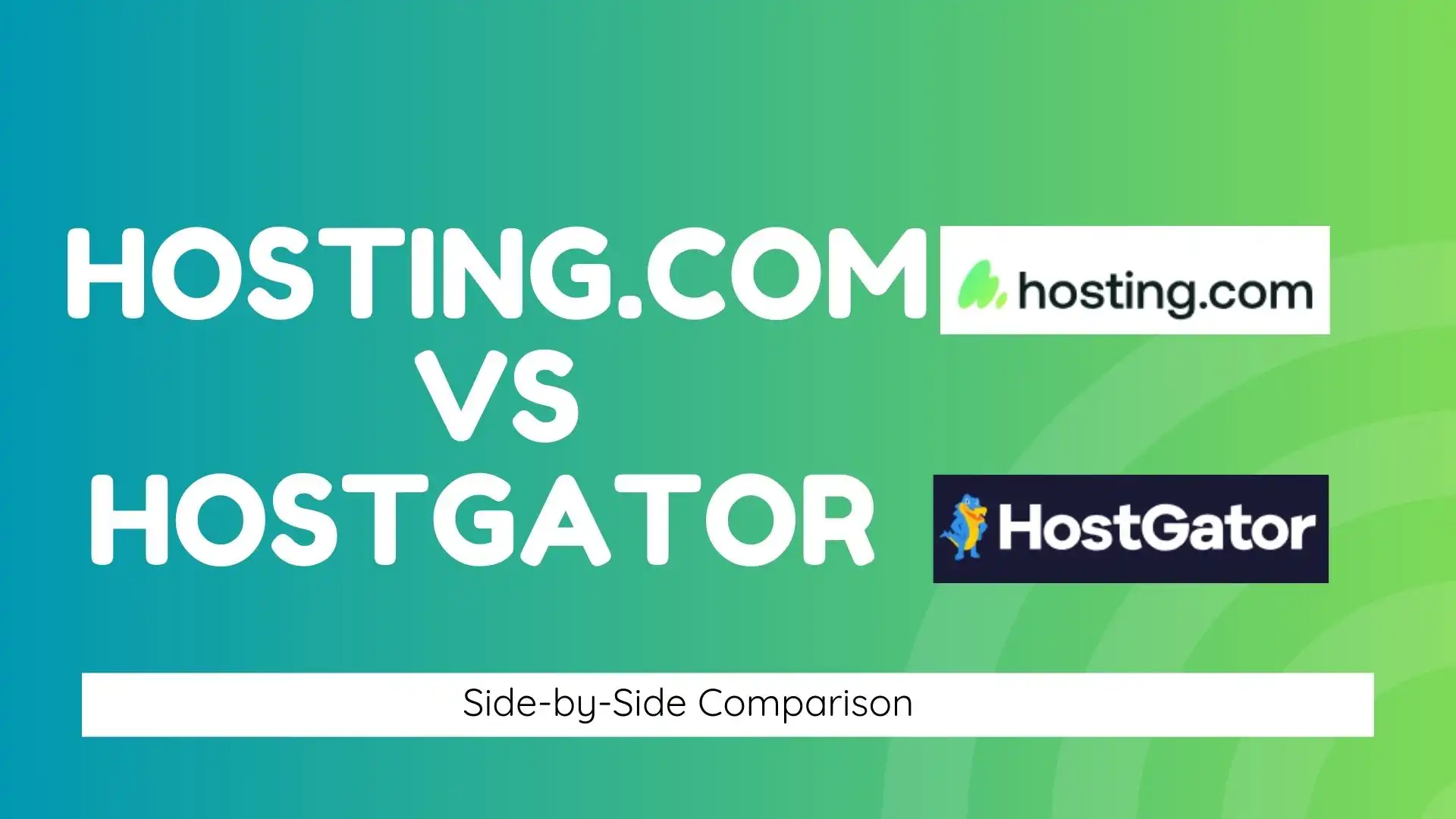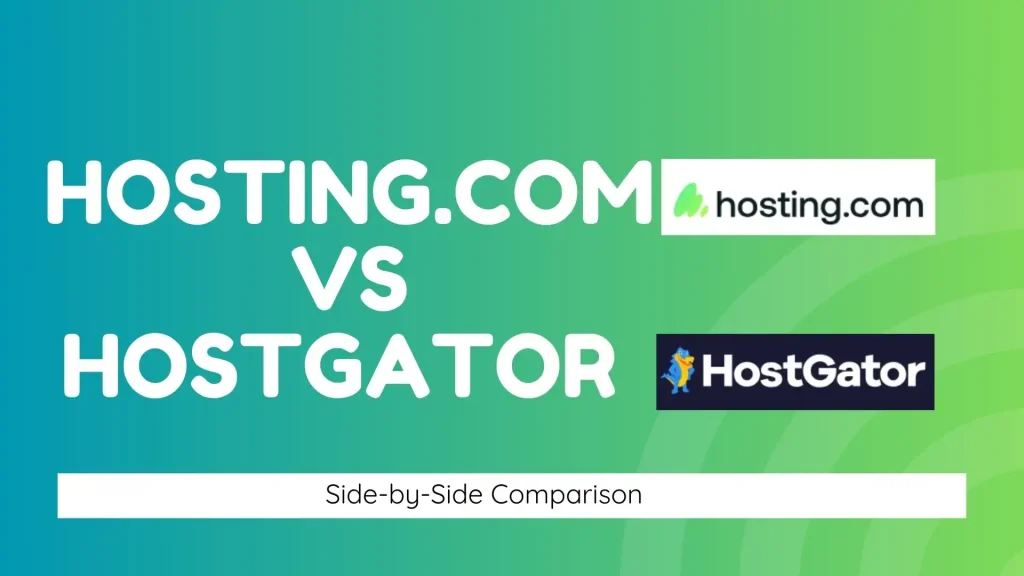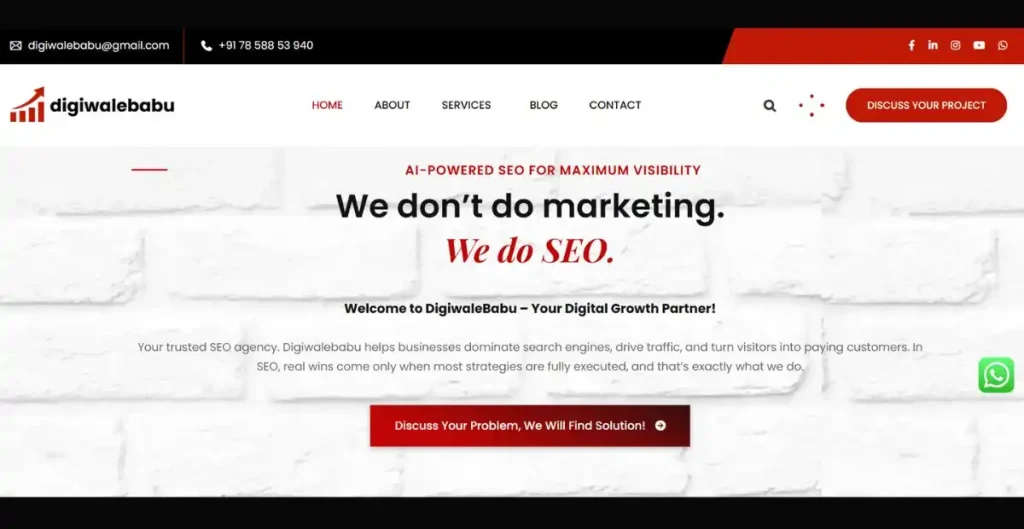
Hosting.com vs HostGator: See the Difference
Table of Contents
When it comes to choosing the right hosting provider, the decision often narrows down to well-known players in the industry. Two of the most debated names are Hosting.com and HostGator. Businesses, bloggers, and eCommerce owners want hosting that is reliable, secure, and affordable. This is where the Hosting.com vs HostGator discussion becomes essential. At Digiwalebabu, we understand how critical it is to select a hosting partner that aligns with your long-term goals.
In this detailed comparison, we will explore every aspect of Hosting.com vs HostGator—including features, performance, uptime, pricing, support, and pros & cons. The goal is to provide you with clarity so that you can make the best hosting decision without confusion.
Why Compare Hosting.com vs HostGator?
Comparing Hosting.com vs HostGator is important for website owners who want to choose the best hosting solution for their needs. Both providers are well-known in the web hosting industry and offer similar services like Shared, VPS, Dedicated, and WordPress hosting. However, their features, pricing, performance, and target audience differ, making a direct comparison valuable for decision-making.

Bullet Points:
- Strong Market Presence: Both Hosting.com and HostGator are trusted names with solid reputations in the hosting industry.
- Multiple Hosting Options: Each platform provides Shared, VPS, Dedicated, and WordPress hosting solutions to cater to various needs.
- Different Target Users: Hosting.com often appeals to advanced users and businesses, while HostGator is beginner-friendly and suitable for small businesses or bloggers.
- Head-to-Head Alternatives: Since they compete in similar segments, comparing Hosting.com vs HostGator helps users decide which fits their goals better.
- d advanced website owners.
Hosting.com: An Overview

Hosting.com positions itself as a high-performance hosting provider built for speed, security, and growth. With SSD-powered servers and enhanced caching, it appeals to users who need stable and scalable hosting rather than just entry-level options.
Key highlights of Hosting.com:
- Turbo-powered servers delivering faster website load times.
- Free SSL certificates for every plan, ensuring site security.
- Daily automated backups with quick restore functionality.
- Malware protection via HackScan and Patchman.
- Advanced WordPress tools including staging and one-click installation.
HostGator: An Overview

HostGator, on the other hand, is one of the most recognized names in the hosting world. Established in 2002, it has built a reputation for being beginner-friendly and budget-friendly. HostGator’s entry-level pricing makes it attractive to bloggers and small businesses.
Key highlights of HostGator:
- Extremely low introductory pricing.
- Free domain for the first year on eligible plans.
- One-click CMS installs for WordPress and other platforms.
- 45-day money-back guarantee.
- Strong customer support with 24/7 availability.
Hosting.com vs HostGator: Feature Comparison
Here’s a side-by-side table showing where Hosting.com and HostGator stand out:
| Feature | Hosting.com | HostGator |
| Hosting Types | Shared, VPS, WordPress, Reseller, Dedicated | Shared, VPS, WordPress, Reseller, Dedicated |
| Storage | SSD with Turbo performance | SSD (basic optimization) |
| Security | Free SSL, HackScan, Patchman, malware firewall | Free SSL, security add-ons (extra cost) |
| Backups | Free daily backups with restore | Backups available as paid add-on |
| WordPress | Optimized, staging environment | Optimized, but staging limited |
| Money-Back Guarantee | 30-day guarantee | 45-day guarantee |
| Uptime | 99.97% average | 99.89% average |
| Support | 24/7 via chat, phone, tickets | 24/7 via chat, phone, tickets |
Hosting.com vs HostGator: Performance and Uptime

When comparing Hosting.com and HostGator, website speed and uptime are often the deciding factors. Hosting.com focuses on advanced server technology for speed and reliability, while HostGator provides decent performance for budget-conscious users.
- Hosting.com Performance: Turbo servers deliver faster speeds, with load times under 1 second in most tests. Uptime hovers around 99.97%, making it a reliable choice for business-critical websites.
- HostGator Performance: HostGator provides reliable performance for small to mid-sized sites, but real-world uptime sometimes dips below its 99.99% claim, averaging 99.89% in independent tests.
Verdict: Hosting.com wins in speed and consistency, while HostGator holds up well for entry-level users.
Hosting.com vs HostGator: Pricing
When it comes to Hosting.com vs HostGator, pricing often becomes the deciding factor for individuals and businesses alike. Hosting.com positions itself as a performance-driven solution where essential features are bundled into the base plans, while HostGator attracts beginners with ultra-low promotional prices but charges extra for add-ons. This makes Hosting.com more cost-effective in the long run, even though HostGator initially looks cheaper.
Hosting.com Pricing
- Offers attractive introductory discounts, though renewal prices can be higher.
- Includes essential features like daily backups, malware protection, and optimization tools within standard plans.
- Provides better value for long-term users since fewer add-ons are needed.
HostGator Pricing
- Known for its very low starting price (around $2.75/month during promos), making it appealing to beginners.
- Essential features like automated backups, advanced security, and performance upgrades often cost extra.
- Renewal rates increase steeply, narrowing the initial affordability gap.
Verdict
- HostGator is the cheaper option upfront, ideal for small websites or beginners on a tight budget.
- Hosting.com delivers better long-term value, thanks to its all-inclusive features and performance-focused hosting plans.
Hosting.com vs HostGator: Support
- Hosting.com Support: Known for knowledgeable and technically strong staff. Some users report longer wait times for complex issues.
- HostGator Support: Offers round-the-clock support but receives mixed feedback—some users praise quick responses, while others complain about upsell tactics during support chats.
Verdict: Hosting.com provides more technically advanced support, while HostGator is adequate for general queries.
Hosting.com vs HostGator: Pros and Cons
- Hosting.com vs HostGator: Pros and Cons
| Aspect | Hosting.com | HostGator |
| Pros | – Faster page load speeds with SSDs & Turbo servers- Security features included at no extra cost- Daily backups included- Excellent for high-traffic websites | – Very affordable promotional pricing- Free domain for the first year- Beginner-friendly and easy to use- 45-day money-back guarantee |
| Cons | – Renewal prices are higher than average- Support wait times can be long during peak hours | – Extra charges for essential add-ons (backups, malware protection)- Real-world uptime often below advertised 99.99%- Renewal rates increase steeply |
Bullet Point Summary: Hosting.com vs HostGator
- Hosting.com is ideal for performance-driven websites.
- HostGator is best for beginners on a budget.
- Hosting.com offers built-in security and backups, while HostGator relies on paid add-ons.
- Hosting.com uptime: 99.97% vs HostGator uptime: 99.89%.
- Hosting.com renewal costs are high but predictable; HostGator’s initial cost is low but add-ons make it expensive over time.
Which Should You Choose?
Deciding between Hosting.com vs HostGator ultimately depends on your website’s goals, budget, and performance needs. Hosting.com is ideal for users who prioritize speed, reliability, and security, making it a perfect choice for growing businesses, eCommerce stores, or content-heavy blogs. On the other hand, HostGator caters to beginners or small projects where initial cost savings are more important, and users are willing to pay extra for add-ons like backups or advanced security later.
When to Choose Hosting.com:
- Running an eCommerce store that requires fast loading times.
- Managing a growing blog or content-heavy website.
- Prioritizing high uptime and robust security without paying for many add-ons.
When to Choose HostGator:
- Starting a small or personal website on a limited budget.
- Willing to invest in additional features (backups, security) as the site grows.
- Looking for a beginner-friendly, easy-to-manage hosting solution.
Final Verdict
In the Hosting.com vs HostGator comparison, the choice depends on your priorities.
- For long-term performance, fewer headaches with security, and high-speed hosting, Hosting.com is the winner.
- For short-term, low-budget projects where affordability is key, HostGator remains a safe bet.
At Digiwalebabu, our recommendation is clear: if you see your website as a serious business asset, Hosting.com provides better value. If your project is experimental or hobby-based, HostGator’s budget plans make sense.

Frequently Asked Questions About Hosting.com vs HostGator
Which is faster, Hosting.com or HostGator?
Hosting.com generally offers faster load times due to SSD Turbo servers, while HostGator is slightly slower but still reliable for small to medium sites.
Is Hosting.com more expensive than HostGator?
Hosting.com has higher renewal rates but includes essential features, whereas HostGator starts cheaper but often requires paid add-ons.
Which is better for beginners?
HostGator is more beginner-friendly with easy setup, while Hosting.com suits users who need advanced performance and security.
Do both providers offer WordPress hosting?
Yes, both Hosting.com and HostGator provide optimized WordPress hosting, but Hosting.com includes staging and pre-installed tools.
What is the uptime difference between Hosting.com and HostGator?
Hosting.com averages 99.97% uptime, while HostGator averages 99.89%, making Hosting.com slightly more reliable for high-traffic sites.
Which provider includes backups by default?
Hosting.com offers daily automated backups with restore options, while HostGator’s backup services are mostly paid add-ons.
How is customer support for Hosting.com vs HostGator?
Hosting.com provides technically advanced support, while HostGator offers 24/7 support that is beginner-friendly but sometimes less technical.
Which is better for eCommerce websites?
Hosting.com is ideal for eCommerce due to faster servers, robust security, and included features like SSL and malware protection.
Are there money-back guarantees for both?
Yes, Hosting.com offers a 30-day guarantee, while HostGator provides a 45-day money-back guarantee.
Which is more cost-effective in the long run?
Hosting.com offers better long-term value since it includes essential features, whereas HostGator may become costly after adding necessary upgrades.
Conclusion
The debate of Hosting.com vs HostGator is not about which one is “bad,” but about which is “best for you.” Hosting.com is designed for scalability, security, and long-term ROI. HostGator, with its lower entry costs, is built for affordability and accessibility.
By carefully considering your project’s size, goals, and growth potential, you can make the right call. Whether you prioritize cost savings now or performance stability later, the Hosting.com vs HostGator comparison above should guide your decision.
